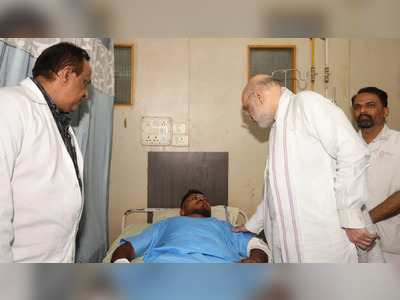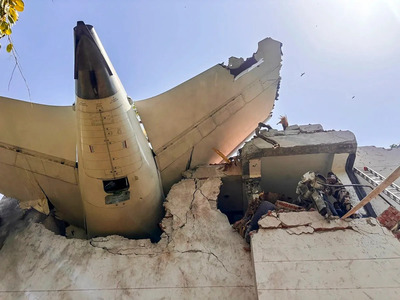Ukraine and Russia Conduct New Prisoner Swap Amid Ongoing Hostilities
The exchange of soldiers comes after Russian strikes killed at least three in Ukraine.
On Tuesday, Ukraine and Russia facilitated a new phase of their ongoing prisoner exchange, marking a significant development amidst the stalled peace talks that had recently taken place in Istanbul.
This latest swap occurred shortly after overnight Russian strikes, which resulted in the deaths of at least three individuals in Ukraine.
According to statements from the Russian Ministry of Defense, a second group of Russian servicemen has been returned from territories controlled by the Ukrainian government, while a contingent of Ukrainian armed forces prisoners was similarly transferred.
Ukrainian President Volodymyr Zelenskyy noted that the exchanged individuals included 'soldiers with serious injuries' sustained during combat.
The agreement to release all seriously injured or sick prisoners of war and those under 25 years old was made during the latest peace talks between Kyiv and Moscow on June 2 in Istanbul.
The exact number of soldiers involved in this recent exchange has not yet been disclosed, as the process began on Monday.
Concurrently, new aerial bombardments by Russia resulted in fatalities and injuries.
On Tuesday, Russia launched a series of attacks utilizing hundreds of drones, which led to at least three deaths and several injuries in Kyiv and Odesa.
Ukrainian air defense systems reportedly intercepted 213 out of 315 explosive drones, along with seven missiles, successfully neutralizing them.
Several Ukrainian areas were affected by these strikes, including the coastal city of Odesa, where at least two individuals were killed, and nine others injured, according to the regional governor.
In Kyiv, Russian shelling impacted residential buildings and warehouses, leading to one fatality and four injuries.
A reporter confirmed hearing a minimum of twelve explosions and active anti-aircraft fire during the assaults.
The Russian military stated that it targeted Ukrainian military sites, including missile and tank manufacturing facilities, airstrips, and ammunition and fuel depots.
In a separate incident, one individual was killed and four others injured in the Russian region of Belgorod due to drone attacks that destroyed a store, as reported by Governor Vyacheslav Gladkov.
Following the nighttime bombings, President Zelenskyy emphasized the importance of concrete actions in response to Russian aggression rather than silence from the global community.
He called for increased American engagement, suggesting that Washington has the capability to compel Russia towards peace, alongside a unified European stance against the conflict.
However, former US President Donald Trump distanced himself from the conflict in recent weeks, comparing the Russian invasion of Ukraine, which began in 2022, to 'children fighting.' He implied he might allow the continuation of hostilities.
As Russia has threatened 'comprehensive sanctions' should Ukraine refuse a ceasefire, European nations are struggling to determine appropriate responses without American support.
The President of the European Commission, Ursula von der Leyen, proposed reducing the current price cap on Russian oil exports from $60 to $45, as Moscow continues to reject calls for an unconditional ceasefire.
There remains uncertainty surrounding the exchange of thousands of fallen soldiers’ bodies, also part of the Istanbul agreements earlier in June.
While Russia consented to deliver 6,000 bodies to Ukraine, it has indicated that it awaits confirmation from Kyiv.
Kremlin spokesperson Dmitry Peskov mentioned that refrigerated trucks containing the bodies of certain Ukrainian soldiers awaiting exchange have been at the border 'for days' pending a final agreement.
Meanwhile, fighting continues on the ground.
The Russian military announced an attack on the Dnipropetrovsk region of Ukraine, bordering the partially Russian-controlled cities of Donetsk and Zaporizhzhia, marking a shift in military operations since the war began.
Russia has continued to present demanding conditions, particularly regarding Ukraine's concession of territories annexed by Moscow and its abandonment of NATO membership aspirations.
Kyiv and its allies reject a proposed 'unconditional' 30-day ceasefire, viewing it as a potential opportunity for Ukrainian forces to regroup effectively.
Conversely, Ukraine is insisting on the withdrawal of Russian forces from its territories and demands 'security guarantees' from the West, whether through troop deployment or military agreements, while characterizing Russia's demands as ultimatums.
This latest swap occurred shortly after overnight Russian strikes, which resulted in the deaths of at least three individuals in Ukraine.
According to statements from the Russian Ministry of Defense, a second group of Russian servicemen has been returned from territories controlled by the Ukrainian government, while a contingent of Ukrainian armed forces prisoners was similarly transferred.
Ukrainian President Volodymyr Zelenskyy noted that the exchanged individuals included 'soldiers with serious injuries' sustained during combat.
The agreement to release all seriously injured or sick prisoners of war and those under 25 years old was made during the latest peace talks between Kyiv and Moscow on June 2 in Istanbul.
The exact number of soldiers involved in this recent exchange has not yet been disclosed, as the process began on Monday.
Concurrently, new aerial bombardments by Russia resulted in fatalities and injuries.
On Tuesday, Russia launched a series of attacks utilizing hundreds of drones, which led to at least three deaths and several injuries in Kyiv and Odesa.
Ukrainian air defense systems reportedly intercepted 213 out of 315 explosive drones, along with seven missiles, successfully neutralizing them.
Several Ukrainian areas were affected by these strikes, including the coastal city of Odesa, where at least two individuals were killed, and nine others injured, according to the regional governor.
In Kyiv, Russian shelling impacted residential buildings and warehouses, leading to one fatality and four injuries.
A reporter confirmed hearing a minimum of twelve explosions and active anti-aircraft fire during the assaults.
The Russian military stated that it targeted Ukrainian military sites, including missile and tank manufacturing facilities, airstrips, and ammunition and fuel depots.
In a separate incident, one individual was killed and four others injured in the Russian region of Belgorod due to drone attacks that destroyed a store, as reported by Governor Vyacheslav Gladkov.
Following the nighttime bombings, President Zelenskyy emphasized the importance of concrete actions in response to Russian aggression rather than silence from the global community.
He called for increased American engagement, suggesting that Washington has the capability to compel Russia towards peace, alongside a unified European stance against the conflict.
However, former US President Donald Trump distanced himself from the conflict in recent weeks, comparing the Russian invasion of Ukraine, which began in 2022, to 'children fighting.' He implied he might allow the continuation of hostilities.
As Russia has threatened 'comprehensive sanctions' should Ukraine refuse a ceasefire, European nations are struggling to determine appropriate responses without American support.
The President of the European Commission, Ursula von der Leyen, proposed reducing the current price cap on Russian oil exports from $60 to $45, as Moscow continues to reject calls for an unconditional ceasefire.
There remains uncertainty surrounding the exchange of thousands of fallen soldiers’ bodies, also part of the Istanbul agreements earlier in June.
While Russia consented to deliver 6,000 bodies to Ukraine, it has indicated that it awaits confirmation from Kyiv.
Kremlin spokesperson Dmitry Peskov mentioned that refrigerated trucks containing the bodies of certain Ukrainian soldiers awaiting exchange have been at the border 'for days' pending a final agreement.
Meanwhile, fighting continues on the ground.
The Russian military announced an attack on the Dnipropetrovsk region of Ukraine, bordering the partially Russian-controlled cities of Donetsk and Zaporizhzhia, marking a shift in military operations since the war began.
Russia has continued to present demanding conditions, particularly regarding Ukraine's concession of territories annexed by Moscow and its abandonment of NATO membership aspirations.
Kyiv and its allies reject a proposed 'unconditional' 30-day ceasefire, viewing it as a potential opportunity for Ukrainian forces to regroup effectively.
Conversely, Ukraine is insisting on the withdrawal of Russian forces from its territories and demands 'security guarantees' from the West, whether through troop deployment or military agreements, while characterizing Russia's demands as ultimatums.








